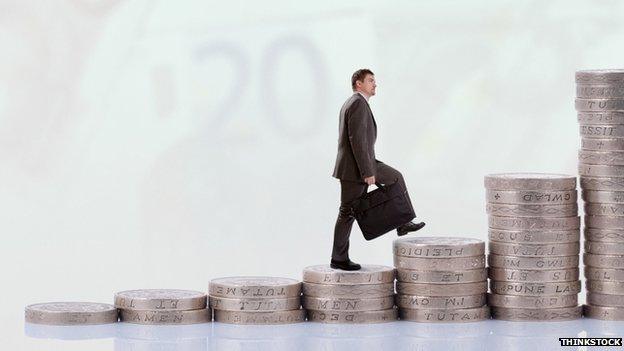Richer at last?
- Published
- comments

It has been a journey of a good six years, give or take the odd blip, but weekly earnings do now seem to be pulling ahead of Consumer Price Index (CPI) inflation.
This is especially true of the private sector, which accounts for 82% of jobs (and rising) - where average weekly earnings rose 2.2% in October, compared with inflation of 1.3% in that month and 1% in November.
The fastest wage growth was 3% in finance and business services - don't curse please, it's unbecoming - and 2.7% in construction.
The shrinking public sector saw a less-than-inflation 0.5% rise.
In the whole economy, the one-month increase was 1.8% and it was 1.4% over the three months to the end of October.
Mending the deficit
Why does this matter, apart from the bloomin' obvious?
Well if the trend continues and the gap between pay and inflation were to widen, it would go some way towards mending the public-sector's £91bn deficit, in that tax revenues might increase a bit faster than CPI-linked welfare payments.
That said, with inflation so low and falling, the government's promise that the state pension will rise by at least 2.5% becomes more and more expensive.
And it also means household spending may be a bit more sustainable and may continue to drive the UK's recovery, without household debts becoming utterly unsupportable again too quickly.
Do today's figures tell us much about when the Bank of England will want to touch the brake slightly, with a tiny rise in interest rates, to eliminate any incipient inflationary pressure?
Well even 2.2% private sector wage growth hardly looks like runaway inflation. So any increment to interest rates still looks implausible this side of an election.
If there is a big noise from these figures it is in the magical world of pre-election politics.
Hence this was the reaction of the Tory side of the Treasury:
"Final plank of Labour economic argument collapses five months before polling day with regular pay rising significantly above inflation".
Hmmm.
It is true that one huge plank of Labour's attack on the Tories and Liberal Democrats was that living standards have been falling for year after grinding year on the coalition's watch.
But it will still be a few years yet before the net, after-everything income of a typical household is back to its previous peak.
And also the Tories would presumably not wish voters to be too confident that good times are back - because history shows the electorate is less frightened of a change of government when they take prosperity for granted (by the way, I think there is little prospect of such generalised economic sangfroid).